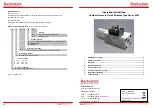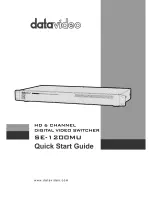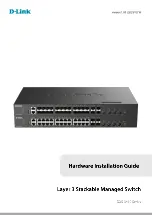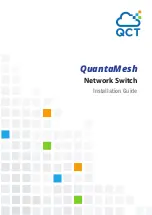
Open Shortest Path First (OSPFv2 and OSPFv3)
Open shortest path first (OSPFv2 for IPv4) and OSPF version 3 (OSPF for IPv6) are supported on Dell Networking OS.
This chapter provides a general description of OSPFv2 (OSPF for IPv4) and OSPFv3 (OSPF for IPv6) as supported in the Dell Networking
Operating System (OS).
NOTE:
The fundamental mechanisms of OSPF (flooding, DR election, area support, SPF calculations, and so on) are the same
between OSPFv2 and OSPFv3. This chapter identifies and clarifies the differences between the two versions of OSPF. Except
where identified, the information in this chapter applies to both protocol versions.
OSPF protocol standards are listed in the
chapter.
Topics:
•
•
•
•
Configuration Task List for OSPFv3 (OSPF for IPv6)
Protocol Overview
OSPF routing is a link-state routing protocol that calls for the sending of link-state advertisements (LSAs) to all other routers within the
same autonomous system (AS) areas.
Information on attached interfaces, metrics used, and other variables is included in OSPF LSAs. As OSPF routers accumulate link-state
information, they use the shortest path first (SPF) algorithm to calculate the shortest path to each node.
OSPF routers initially exchange HELLO messages to set up adjacencies with neighbor routers. The HELLO process is used to establish
adjacencies between routers of the AS. It is not required that every router within the AS areas establish adjacencies. If two routers on the
same subnet agree to become neighbors through the HELLO process, they begin to exchange network topology information in the form of
LSAs.
In OSPFv2 neighbors on broadcast and NBMA links are identified by their interface addresses, while neighbors on other types of links are
identified by RID.
Autonomous System (AS) Areas
OSPF operates in a type of hierarchy.
The largest entity within the hierarchy is the autonomous system (AS), which is a collection of networks under a common administration
that share a common routing strategy. OSPF is an intra-AS (interior gateway) routing protocol, although it is capable of receiving routes
from and sending routes to other ASs.
You can divide an AS into a number of areas, which are groups of contiguous networks and attached hosts. Routers with multiple interfaces
can participate in multiple areas. These routers, called area border routers (ABRs), maintain separate databases for each area. Areas are a
logical grouping of OSPF routers identified by an integer or dotted-decimal number.
32
Open Shortest Path First (OSPFv2 and OSPFv3)
539
Summary of Contents for S3048-ON
Page 1: ...Dell Configuration Guide for the S3048 ON System 9 11 2 5 ...
Page 137: ...0 Gi 1 1 Gi 1 2 rx Flow N A N A 0 0 No N A N A yes Access Control Lists ACLs 137 ...
Page 142: ...Figure 10 BFD Three Way Handshake State Changes 142 Bidirectional Forwarding Detection BFD ...
Page 241: ...Dell Control Plane Policing CoPP 241 ...
Page 287: ... RPM Synchronization GARP VLAN Registration Protocol GVRP 287 ...
Page 428: ...Figure 53 Inspecting the LAG Configuration 428 Link Aggregation Control Protocol LACP ...
Page 477: ...Figure 73 Configuring Interfaces for MSDP Multicast Source Discovery Protocol MSDP 477 ...
Page 478: ...Figure 74 Configuring OSPF and BGP for MSDP 478 Multicast Source Discovery Protocol MSDP ...
Page 483: ...Figure 77 MSDP Default Peer Scenario 2 Multicast Source Discovery Protocol MSDP 483 ...
Page 484: ...Figure 78 MSDP Default Peer Scenario 3 484 Multicast Source Discovery Protocol MSDP ...
Page 745: ...Figure 104 Single and Double Tag TPID Match Service Provider Bridging 745 ...
Page 746: ...Figure 105 Single and Double Tag First byte TPID Match 746 Service Provider Bridging ...
















































